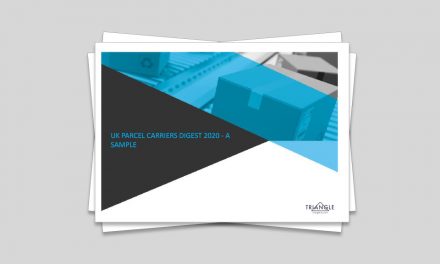
Triangle surveys show a diverging delivery market in the UK with B2C and B2B showing very different dynamics
The 2016 edition of the ‘UK Domestic Express Parcels Distribution Survey’ recently published by Triangle Management Services, has found that B2C shippers tend to switch between carriers frequently, whilst B2B shippers tend to stay with their main domestic parcels carrier for longer. This is creating a divergent market with different dynamics. Carriers tend to offer very similar services but the economics behind them differ widely. It will be interesting to see which carriers move ahead in one or both segments over the next twelve months. In B2C, consumer demands for fast and free deliveries means shippers are looking to increase service delivery options or cut costs. In B2B, the dynamics are different, the environment appears calm but this could all change next year due to increased marketing efforts by the carriers to offer shippers more choice.
Key insights from this year’s reports include:
- In the B2B segment, the number of shippers using their main carrier for less than two years is 18% which has fallen to a five-year low. To combat this, there is evidence of increased marketing activities from the carriers. Whilst this year has shown limited impact from their efforts (with only 8% switching carriers), there may be changes next year if such marketing activities are sustained alongside improved service levels or price changes.
- In the B2C segment we have seen increased churn to levels last seen in 2012, specifically an 8% increase in businesses who have recently stopped using a carrier and an increase to 22% of carriers with less than two years’ service.
- The B2C survey shows improved service levels, marketing and pricing changes are driving shippers to review their choice of delivery partner.
The 200 plus page report, which was the result of over 900 telephone interviews with B2B and B2C shippers, was carried out between April and July 2016.
For each market segment (B2B and B2C) the survey can pinpoint the most important performance factors that shippers rate their delivery partners against and help you set your future strategies. It provides a unique insight into the UK Express Market and is available in various formats from £26,000.
Contact Triangle’s Research Team on +44(0)1628 642910 or email: Saeed Mumtaz, Director of Research & Consultancy for more information.
Survey Highlights:
B2B Loyalty
The survey results show that the percentage of those shippers that stayed with the same primary carrier for over five years has increased from 43% in 2015 to 57% in 2016. Going back even further, loyalty levels are at a five-year high as levels from 2012 to 2014 were around 40-45%. Meanwhile, the share of shippers using their main carrier for less than two years (usually an indicator of intense sales activity and carrier churn) has fallen to a five-year low, falling to 18% in 2016 and not reaching the 20% mark for the first time since 2012. This may also be indicative of favourable fixed price contracts or simply due to satisfactory performance.
Royal Mail included in the B2B Segment
For the first time, Royal Mail’s performance was included in the B2B segment. Their performance is now reviewed and compared to the market across both B2B and B2C markets.
B2C Amazon fulfilment performing well but still room for improvement
Fulfilment by Amazon (FBA), included for the first time in the B2C survey, shows a significant volume delivered through its network. Interestingly whilst FBA performs well, there are still some service improvement opportunities when compared to the best performers.
B2C Service levels are on the rise
Service levels have improved across the industry which is reflected in the increase in the Net Promoter Index. Furthermore, overall performance scores across individual service indicators are 0.2 points higher than last year. Interestingly, in this increasingly competitive environment, some carriers have shown a consistent improvement which is reflected in their improved rankings.
The overall improvement in performance together with expected price increases will be driving shippers to look at the current value of their contracts, which is where the opportunity lies.
Home delivery and next day a preference for B2C shippers customers
Home delivery remains the preferred B2C delivery option for shippers. There has been an increase of 10% in businesses offering a returns service. Compared with last year, usage of 2-3 day services slipped by 8% in favour of next day services and is now the preferred option for over 70% of deliveries.
Triangle’s View
Triangle’s Director of Research and Consultancy, Saeed Mumtaz, commented: “This year’s survey shows the B2C delivery sector is enjoying the benefits of the e-commerce wave with flexible services continuing to meet consumer demands. In the B2B sector things seem stable but we are seeing increased marketing which could mean future changes. All the carriers have upped their game which is creating an increasingly competitive market. But shippers are still expecting to see price increases soon. Carriers will therefore have to decide whether they compete on price or on service. It will be interesting to see which strategy wins out over the next 12 months.”
About Triangle’s B2B & B2C surveys
Triangle conducted over 900 in-depth telephone interviews with B2C and B2B shippers (50/50 split) for the 2016 surveys and collected just over 1,000 benchmark service ratings for the fifteen main carriers used for domestic deliveries.
Carriers benchmarked in the survey include the major global integrators TNT Express, UPS and FedEx, along with home delivery experts Yodel and Royal Mail, plus Parcelforce Worldwide, DPD, Interlink, APC Overnight, UK Mail and freight parcel specialists DX Freight. B2C specialists Hermes are only covered in the B2C survey and the same logic applies for DHL Express and Tuffnells in the B2B segment. Additionally, Fulfilment by Amazon was added for the first time as a benchmark (in the B2C survey) due to the expansion of its own delivery network. Between both surveys a total of fifteen delivery providers offering UK domestic delivery services are rated by their customers, and compared against each other in this survey.
Triangle’s ‘UK Domestic B2B Express Parcels Distribution Survey’ was first published in 1986 and its B2C counterpart was first published in 2008, and both remain the industry standard for the express sector to this day. Its status reflects the way in which subscribers, principally the carriers themselves, use the survey to benchmark themselves against their competitors whilst also judging their own company performance in all the important customer interface areas and the success of new initiatives.
About Triangle Management Services
Triangle Management Services Ltd, founded in 1984, delivers a unique range of business services to leading companies and senior executives managing and shaping the mail and express industry. Triangle’s extensive portfolio of services includes high-level conferences, online and print media, industry-specific research, and strategic consultancy, and provides access to senior players in the sector worldwide.
For further information, please contact Triangle’s Research Team on +44(0)1628 642910 or email:
Saeed Mumtaz, Director of Research & Consultancy.












